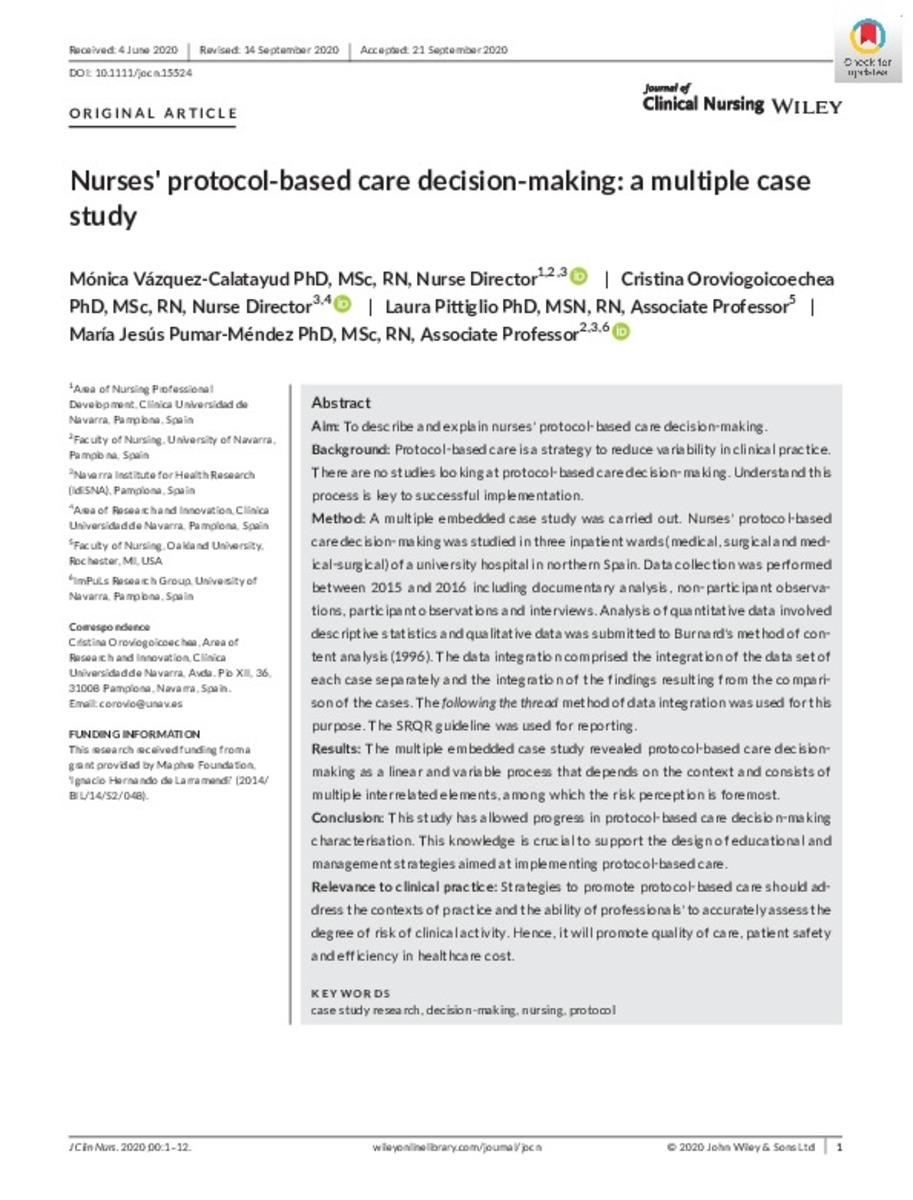Full metadata record
| DC Field | Value | Language |
|---|---|---|
| dc.creator | Vazquez-Calatayud, M. (Mónica) | - |
| dc.creator | Oroviogoicoechea, C. (Cristina) | - |
| dc.creator | Pittiglio, L. (Laura) | - |
| dc.creator | Pumar-Mendez, M.J. (María Jesús) | - |
| dc.date.accessioned | 2020-12-17T13:13:14Z | - |
| dc.date.available | 2020-12-17T13:13:14Z | - |
| dc.date.issued | 2020 | - |
| dc.identifier.citation | Vazquez-Calatayud, M. (Mónica); Oroviogoicoechea, C. (Cristina); Pittiglio, L. (Laura); et al. "Nurses' protocol-based care decision-making: a multiple case study". Journal of clinical nursing. 29 (23-24), 2020, 4806 - 4817 | es |
| dc.identifier.issn | 0962-1067 | - |
| dc.identifier.uri | https://hdl.handle.net/10171/59903 | - |
| dc.description.abstract | Aim: To describe and explain nurses' protocol-based care decision-making. Background: Protocol-based care is a strategy to reduce variability in clinical practice. There are no studies looking at protocol-based care decision-making. Understand this process is key to successful implementation. Method: A multiple embedded case study was carried out. Nurses' protocol-based care decision-making was studied in three inpatient wards (medical, surgical and medical-surgical) of a university hospital in northern Spain. Data collection was performed between 2015 and 2016 including documentary analysis, non-participant observations, participant observations and interviews. Analysis of quantitative data involved descriptive statistics and qualitative data was submitted to Burnard's method of content analysis (1996). The data integration comprised the integration of the data set of each case separately and the integration of the findings resulting from the comparison of the cases. The following the thread method of data integration was used for this purpose. The SRQR guideline was used for reporting. Results: The multiple embedded case study revealed protocol-based care decision-making as a linear and variable process that depends on the context and consists of multiple interrelated elements, among which the risk perception is foremost. Conclusion: This study has allowed progress in protocol-based care decision-making characterisation. This knowledge is crucial to support the design of educational and management strategies aimed at implementing protocol-based care. Relevance to clinical practice: Strategies to promote protocol-based care should address the contexts of practice and the ability of professionals' to accurately assess the degree of risk of clinical activity. Hence, it will promote quality of care, patient safety and efficiency in healthcare cost. | - |
| dc.description.sponsorship | This research received funding from a grant provided by Maphre Foundation, ‘Ignacio Hernando de Larramendi’ (2014/ BIL/14/S2/048). | - |
| dc.language.iso | en | - |
| dc.rights | info:eu-repo/semantics/openAccess | - |
| dc.subject | Case study research | - |
| dc.subject | Decision-making | - |
| dc.subject | Nursing | - |
| dc.subject | Protocol | - |
| dc.title | Nurses' protocol-based care decision-making: a multiple case study | - |
| dc.type | info:eu-repo/semantics/article | - |
| dc.relation.publisherversion | https://pubmed.ncbi.nlm.nih.gov/33007122/ | - |
| dc.description.note | Licencia CC BY NC ND | - |
| dc.identifier.doi | 10.1111/jocn.15524 | - |
| dadun.citation.endingPage | 4817 | - |
| dadun.citation.number | 23-24 | - |
| dadun.citation.publicationName | Journal of clinical nursing | - |
| dadun.citation.startingPage | 4806 | - |
| dadun.citation.volume | 29 | - |
Files in This Item:
Statistics and impact
Items in Dadun are protected by copyright, with all rights reserved, unless otherwise indicated.






